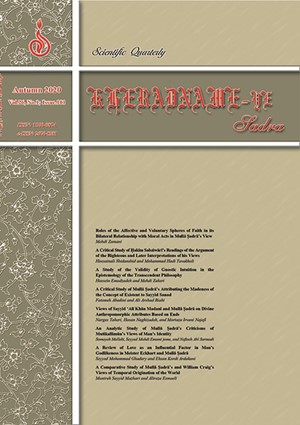-
-
List of Articles
-
Open Access Article
1 - Editor's Note
Seyyed Mohammad Khamenei -
Open Access Article
2 - Roles of the Affective and Voluntary Spheres of Faith in its Bilateral Relationship with Moral Acts in Mullā Ṣadrā’s View
Mehdi Zamani -
Open Access Article
3 - A Critical Study of Ḥakīm Sabziwārī’s Readings of the Argument of the Righteous and Later Interpretations of his Views
Hussein Ali Shidanshid Mohammad Hadi Tavakkoli -
Open Access Article
4 - A Study of the Validity of Gnostic Intuition in the Epistemology of the Transcendent Philosophy
Hossein Emadzadeh Mahdi Zakeri -
Open Access Article
5 - A Critical Study of Mullā Ṣadrā’s Attributing the Madeness of the Concept of Existent to Sayyid Sanad
Fatemeh Abedini Ali Arshad Riahi -
Open Access Article
6 - Views of Sayyid ‘Alī Khān Madanī and Mullā Ṣadrā on Divine Anthropomorphic Attributes Based on Ends
Narges Taheri Hasan Naghizadeh Mortaza Irvani Najafi -
Open Access Article
7 - An Analytic Study of Mullā Ṣadrā’s Criticisms of Mutikallīmūn’s Views of Man’s Identity
Somayeh Malleki Mahdi Emami Jomee Nafiseh Ahl Sarmadi -
Open Access Article
8 - A Review of Love as an Influential Factor in Man’s Godlikeness in Meister Eckhart and Mullā Ṣadrā
Seyyed Mohammad Ghadery Ehsan Kordi Ardakani -
Open Access Article
9 - A Comparative Study of Mullā Ṣadrā’s and William Craig’s Views of Temporal Origination of the World
Monireh Sayyid Mazhari Alireza Esmaeli
-
The rights to this website are owned by the Raimag Press Management System.
Copyright © 2017-2026







